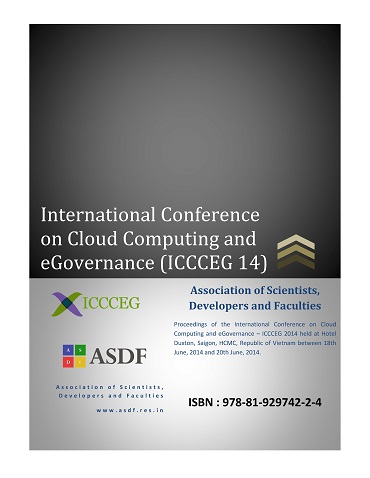- Publication Meta:Value
- Short Title:ICCCEG 2014
- Publisher:ASDF, India
- ISBN 13:978-81-929742-2-4
- ISBN 10:81-929742-2-4
- Language:English
- Type:Hard Bound - Printed Book
- Copyrights:[email protected]
- Editor-in-Chief:Kokula Krishna Hari K
- Conference Dates:18 - 20, June 2014
- Venue Country:Vietnam
- Submitted Papers:496
- Acceptance Rate:0.03%
- Website:www.iccceg.org
Welcome to ASDF Electronic Digital Library!
ICCCEG 2014
ICCCEG 2014
International Conference on Cloud Computing and eGovernance 2014
Paper 007
e- Facilitative Leadership and Management: A Perspective towards Globalization
Enrico C. Riconalla1, Adelfa C. Silor2, Ma. Faye M. Fajardo3, Lowell G. Lucero4, Giselle O. Dangdang5, Sheenalyn M. Abangan6
1,2,3,4,5,6College of Educatiom & MSU-IIT, Philippines
Abstract
Great leaders and managers get things done, and they care deeply about their organizations' success. But sometimes that's not enough; despite heroic efforts they may encounter roadblocks, lack of cooperation, and unforeseen delays. So , this collaborative research focus on the new distinction of analyzing the contribution of facilitative leadership and management using ICT integration or e-“facilitative leadership and management style” as an interdisciplinary approach of educational method used in this is a triangulation of quantitative-qualitative, theoretical and empirical design. Most of the data a7re gathered through analyzing internet sources as used in supporting the data gathered through open-ended questionnaire and focus group discussion as well as one on one interview to the participants of this study. The concept of this study is more on the views and perspective of respondents in using e-facilitative leadership and management towards globalization. There are fifty participants of this study who are randomly selected through systematic sampling design.
Based from the interview, focus group discussion, open-ended question through writing their views and analyzing the different authors' views from the internet sources, the findings reveal that “e-Facilitative Leadership is a transformational learning experience that expands participants' ability to bring out the best in others” using online communication through collaboration and sharing of ideas in educational management including teaching and learning process. Administrators, faculty, staff and students are all leaders. In order to become global leaders, everybody must learn to maintain the passion of internationalization towards organizational direction and momentum while enabling people to take risks, innovate using online media and "own" the outcomes”, have e-facilitative leadership as "the behaviors that enhance the collective ability of a school to adapt, solve problems, and improve performance." Several key strategies are used by e-facilitative leaders: overcoming resource constraints; building teams; providing feedback, coordination, and conflict management; creating communication networks; practicing collaborative politics; and modeling the school's vision. These strategies could be easily dne through digital and online educational management or e-facilitative leadership and management. In conclusion, e-facilitative leadership and management or educational management using ICT is very important towards globalization.
Keywords
Author's Profile
Author profile can be generated and linked through our partners World Book of Researchers. To include your profile online Click Here. After it is approved, please email to edlib @ asdf.res.in to create a link with all the papers.
e-AID
ICCCEG.2014.007
Cite this Article as Follows
Enrico C. Riconalla, Adelfa C. Silor, Ma. Faye M. Fajardo, Lowell G. Lucero, Giselle O. Dangdang, Sheenalyn M. Abangan. e- Facilitative Leadership and Management: A Perspective towards Globalization. International Conference on Cloud Computing and eGovernance 2014. Vol. 1. Chennai: Association of Scientists, Developers and Faculties, 2014. 45-48. Print.
© 2010 - by EDLIB .
All Rights Reserved.

